Ireland's General Election 2020 will be held on February 8 - here is a breakdown of the political parties at play
Update: This survey was closed on February 7. Stay tuned for results!
Ireland’s general election 2020 will be held on Saturday, February 8 after Irish President Michael D. Higgins dissolved the 32nd Dáil Éireann (Irish Parliament) at the request of Taoiseach Leo Varadkar on January 14, 2020.
Read More: Irish general election called for February 8
In the upcoming Irish general election, which will be hosted for the first time on a Saturday since 1918, 159 of 160 Dáil Éireann seats will be contested, with the outgoing Ceann Comhairle being re-elected automatically unless he opts to retire from the Dáil. A party needs to win 80 seats to achieve the majority.
The Irish electoral system differs from that of the US in that Irish citizens cast votes for candidates to represent their constituencies in the Dáil instead of voting for a single leader who represents their party.
In some cases, a voter’s favorite representative for their constituency might not be with the party he or she would like to see in power overall, which means they must prioritize which is more important to them as a voter.
In Ireland, the party that wins the most Dáil seats gains control (or, sometimes, two parties will agree to govern as a coalition) and the leader of that party is typically voted into office as Taoiseach (Prime Minister) by the Dáil when it enters session following the election.
Nominations for candidates in the general election close on Wednesday, January 22nd. Voters in Ireland are encouraged to check their voting eligibility online.
Read More: No one knows who will win the Irish election
Below is a brief guide to the political parties active in Ireland’s general election 2020:
Fine Gael
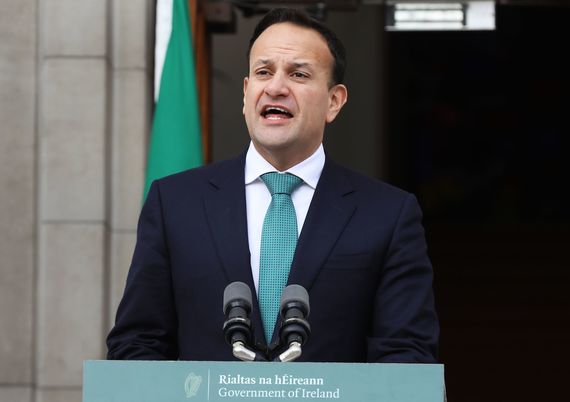
An Taoiseach, the leader of Fine Gael, Leo Varadkar.
Party profile: Ireland’s center-right, Christian Democratic party. Its origins lie with the pro-treaty (the Anglo-Irish Treaty of 1921) side of the Irish Civil War.
Ideologies: Liberal conservatism, Christian democracy, liberalism, pro-Europeanism, Irish reunification. Fine Gael says it “bases its outlook on key principles: Equality of Opportunity, Enterprise and Reward, Security, Integrity and Hope.”
Party leader: Leo Varadkar (Ireland’s Taoiseach since June 2017)
Seat numbers at the dissolution of 32nd Dail: 47 TDs, 20 Senators
Slogans: "A future to look forward to” and “Building a Republic of Opportunity, Taking Ireland Forward Together”
Social Media: Website, Facebook, Twitter
Fianna Fáil
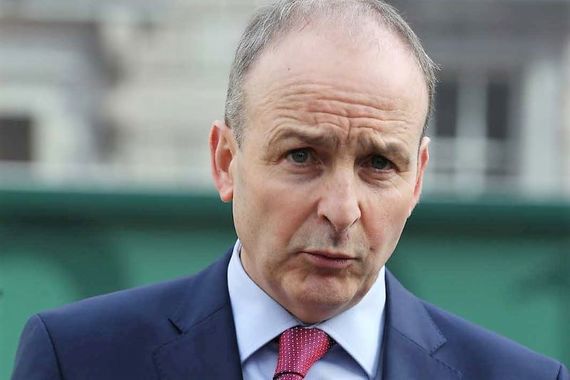
Micheál Martin, leader of Fianna Fael.
Party profile: The Fianna Fáil party also stems back to the Irish Civil War (and the Anglo-Irish Treaty), with Fianna Fáil emerging as the anti-treaty, Republican political force. Considered center to center-right, Fianna Fail is seen as slightly more liberal than Fine Gael.
Ideologies: Big tent, liberalism, conservatism, pro-Europeanism. According to Fianna Fáil, "Republican here stands both for the unity of the island and a commitment to the historic principles of European republican philosophy, namely liberty, equality, and fraternity."
Party leader: Micheál Martin
Seat numbers at the dissolution of 32nd Dail: 45 TDs, 13 Senators
Slogans: “An Ireland for all" (Éire do chách)”
Social Media: Website, Facebook, Twitter
Read More: Racism is an issue in an Irish general election for the first time
Sinn Féin
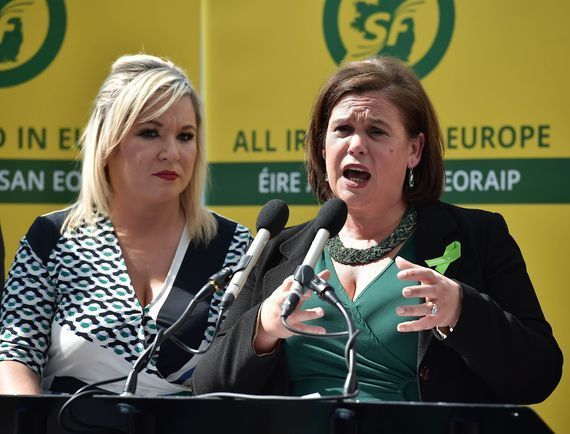
Sinn Féin President Mary Lou McDonald (right) and First Deputy Michelle O'Neill.
Party profile: Sinn Féin was founded in 1905 and was the major Irish republican party until Fianna Fail broke away in 1926 over how to unite Ireland, Fianna Fail preferring to work within the existing political structure.
Ideologies: Irish republicanism, left-wing nationalism, democratic socialism. Sinn Féin, viewed as center-left to left-wing, describe themselves as an “Irish republican party dedicated to the reunification of Ireland and the building of a new republic based on the principles of freedom, justice, and equality.”
Party leader: Mary Lou McDonald
Seat numbers at the dissolution of 32nd Dail: 22 TDs, 6 Senators
Slogans: "Standing up for Irish unity,” and “Giving workers and families a break”
Social Media: Website, Facebook, Twitter
Labour
Party profile: Labour is Ireland’s center-left, Social Democrat party. It was founded in 1912 by Ireland’s famous labor activists James Connolly, James Larkin, and William O’Brien. A center-left party, Labour views itself as the political arm of the Irish trade union and labour movement, and seeks to represent workers' interests in the Dáil and on a local level.
Ideologies: Social democracy, pro-Europeanism, democratic socialism. Dedicated to “a real living wage for workers; radical change to housing policy; a just transition to a low carbon economy; an end to health inequality; every child to have a fair start in life."
Party leader: Brendan Howlin
Seat numbers at the dissolution of 32nd Dail: 7 TDs, 4 Senators
Slogans: “Building an equal society”
Social Media: Website, Facebook, Twitter
Solidarity - People Before Profit
Party profile: An electoral alliance between the Solidarity party (formerly the Anti-Austerity Alliance, “AAA”) and the People Before Profit party. In September 2019, the RISE (Radical, Internationalist, Socialist and Environmentalist) party was added to the alliance. The Solidarity-PBP party is viewed as left-wing to far-left.
Ideologies: Democratic socialism, Political radicalism, Anti-capitalism, Eco-socialism, Trotskyism, Soft Euroscepticism, Socialism. PBP describes itself as "rooted in the values of international solidarity, economic equality & personal liberty," and Solidarity describes itself as "a growing left alternative to the parties of the establishment, fighting against austerity, for equality & social justice."
Party Leader: Collective leadership
Seat numbers at the dissolution of 32nd Dail: 6 TDs, 0 Senators
Slogans: “Socialism for the 21st century”
Social Media: Website, Facebook, Twitter
Read More: Ireland needs to elect more women and this is how we achieve it
Green Party
Party profile: Founded in 1981 as the Ecology Party of Ireland, in 1983 it became the Green Party. This center-left party describes themselves as a “progressive political party focused on social justice, democracy and protection of the environment.”
Ideologies: Green politics, pro-Europeanism. Primarily focused on environmentalism, but also dedicated to the protection of the Irish language, lowering the voting age in Ireland to 16, a directly elected Seanad, support for universal healthcare, and a constitutional amendment which guarantees that the water of Ireland will never be privatized.
Party leader: Eamon Ryan
Seat numbers at the dissolution of 32nd Dail: 3 TDs, 1 Senator
Slogans: "The future belongs to all of us,” and “Want Green, Vote Green”
Social Media: Website, Facebook, Twitter
Social Democrats
Party profile: Launched in July 2015 by three independent TDs: Stephen Donnelly, Catherine Murphy, and Róisín Shortall.
Ideologies: Social democracy, Nordic model, pro-Europeanism. Proposing Sláintecare, a fully costed plan for a universal, single-tier public health service that would join up health and social care in the Republic of Ireland. Prioritizes universal access to affordable housing, equal access and non-religious discrimination in schools, and extended unpaid parental leave.
Party leader: Catherine Murphy and Roisin Shortall
Seat numbers at the dissolution of 32nd Dail: 2 TDs, 0 Senators
Slogans: “Hope for better. Vote for better.”
Social Media: Website, Facebook, Twitter
Other parties set to be represented in Ireland's 2020 general election are Aontú, Renua, Independents 4 Change, and the Independent Alliance, which does not consider itself a political party but rather a group.
Read More: Irish politicians boycott Royal Irish Constabulary commemoration in Dublin
Now IrishCentral wants to know - which Irish political party would get your support in the upcoming general election? Let us know in our survey here, and sound off in the comments, below:
Create your own user feedback survey
* Originally published on Jan 21, 2020.
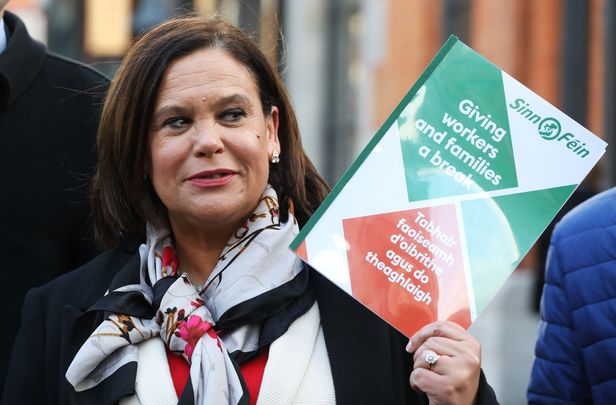


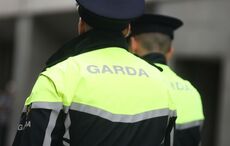
Comments